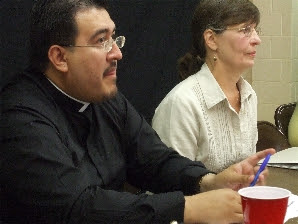Movement
How to sustain the momentum? How to facilitate further dialogue? How to measure the impacts?
These are questions we continue to grapple with at Voces de la Frontera one month post reality tour. Nonetheless local activity statewide implicates that the tour was indeed effective in stimulating action. Some snapshots are provided below.
Northeastern Wisconsin has been busy. One week following the tour members of ESTHER, our Appleton host, assisted the Mexican Consulate in the distribution of over 1000 passports and matriculas over the course of 4 days. Esther also polled 60 attendees on immigration issues and will form a database from these attendees for future initiatives. In the spirit of promoting understanding a small group of organizers in Green Bay have been working on forming a game that would simulate the immigration process and some of the key decisions one faces on all sides of the debate. A game has already been developed and piloted by a law firm in Iowa in July. The Green Bay team is using the Iowa game as template to develop a local simulation game.
Regarding the ordinances, on August 1st the ACLU of Wisconsin submitted a letter to the Green Bay City attorney’s office regarding the Hazelton decision and the relevance of the decision to the municipal code passed in Green Bay. The Hazelton decision was a recent decision by the US District court condemning an anti-immigrant ordinance passed in Hazelton, PA. U.S. District Judge Munley wrote, “We cannot say clearly enough that persons who enter this country without legal authorization are not stripped immediately of all their rights.” Munley declared that 14th amendment extends legal protection to all “persons” not just “citizens.” The ACLU of Wisconsin sent another letter on August 1st to the Brown County Corporation Counsel questioning the legality of a proposed ordinance controlling the employment of immigrants.
Ordinance activity has not been limited to Green Bay albeit that ordinance has been the most high profile. The anti-racism commission in Wausau held a meeting with local police regarding the development of ordinances that are pro-immigrant one week after the Reality Tour. Meetings are being planned with City Council in Racine regarding a proposed ordinance that is anti-immigrant.
In Whitewater, almost a year has passed since the raid on Star Packaging. Over $1000 was collected during the tour for the legal defense fund of these workers. Their hearings are still pending. Sentencing for Al Petrie, owner of Star Packaging, is still pending. A vigil is being planned in Whitewater for Wednesday August 8th.
The Milwaukee stop had a sanctuary focus and the committee has been working tirelessly since. Sanctuary organizers are currently collecting money to hire a full time coordinator in order to expand the sanctuary movement. They are also preparing for August 14th which marks a national day of action in the new sanctuary movement. Forty days after the Senate bill failed cities across the nation will declare themselves sanctuary cities and churches, mosques and synagogues will make public their commitment to the new sanctuary movement. An event is being planned in Milwaukee to stand in solidarity.
In Madison, the story of Tomas Contreras and his detention city nightmare has continued to pick up media attention. News of our tour reached the group Private Corrections Institute, an anti private prisons group in Tallahassee. The group has invited Tomas to give testimony at the Correctional Corporations of America conference in Kansas City next week.
These are just a few anecdotes of statewide activity in the midst of a flurry of national debate since the Hazelton decision and promulgation of many local ordinances. It is a top issue for political candidates right now and as the debate continues, local activity will no doubt continue to escalate.



 So starts the testimony of our local addition to the Wausau panel. She, like many Mexican Americans, has a family of mixed legality. Her father came here before 1986 and was granted amnesty. Her mother did not and it was a long fight to bring her to join the rest of the family. Our panelist is undocumented despite living most of her life here. She has three children, two teens and a twenty month old baby. She works as a receptionist but is studying to be a nurse. She is not a citizen and does not qualify for loans. Her two oldest sons are joining the military. They want to serve this country she says. She working hard, but still feels like doors are closing.
So starts the testimony of our local addition to the Wausau panel. She, like many Mexican Americans, has a family of mixed legality. Her father came here before 1986 and was granted amnesty. Her mother did not and it was a long fight to bring her to join the rest of the family. Our panelist is undocumented despite living most of her life here. She has three children, two teens and a twenty month old baby. She works as a receptionist but is studying to be a nurse. She is not a citizen and does not qualify for loans. Her two oldest sons are joining the military. They want to serve this country she says. She working hard, but still feels like doors are closing.








